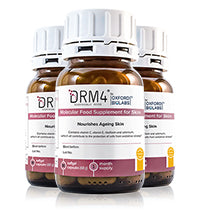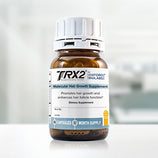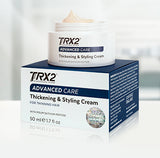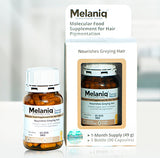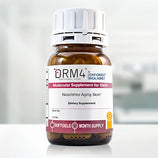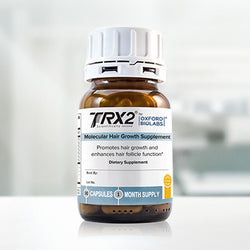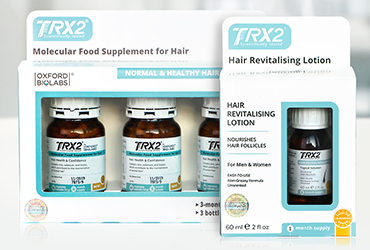Grey hair is one of those annoyances that happens to all of us sooner or later. As the rate of greying various wildly from person to person, you may have little idea when you can expect to go grey (or fully grey!), let alone why own greying process is what it is. That’s why we decided to shed some light on the common reasons hair turns grey, and the best ways to prevent grey hair.
The question of what causes grey hair has a relatively simple answer: the colour of your hair is directly affected by the body’s ability to produce melanin, which is the natural pigment that gives hair its colour. The colour of your hair is determined by your particular type of hair pigment: either dark (eumelanin) or light (phaeomelanin), and the colour is controlled by melanocyte stem cells located in the base of your hair follicles. When these cells stop producing melanin, your hair turns grey (and eventually white).
Why your hair turns grey
Now that the mechanism for hair greying has been explained, you may be wondering why hair goes grey at different rates. While we can’t all expect to go grey at a steady pace over time, it’s also pretty common to go grey way earlier than we might have imagined.
Genetic premature hair greying (PHG) is a reality for some people. PHG is defined as going grey before 20 years of age in Caucasians, or before 30 years in African Americans. A number of fortunate others manage to hang onto their colour until they are 60.
For most, the process of hair greying begins in the thirties. 74% of men and women go significantly grey between 45 and 65, and by the time you turn 50 you should expect about half of your hair to have turned grey.
The most common reasons for greying hair
There are many reasons hair goes grey, but below are four of the most common ones. Often the greying of hair is a complex multi-factorial process. It may not be down to just one cause; instead it may be an interplay of genetic, nutritional and environmental factors.
- Genetics
The process of hair changing from coloured to grey is mainly down to genetics factors, which may be inherited from either parent. Scientists have identified the first gene for grey hair: the variant, IRF4, is also associated with blonde or lighter-coloured hair. The researchers found the gene by analysing the genomes of 6,357 people from a diverse range of volunteers from Brazil, Colombia, Chile, Mexico and Peru.
- Vitamin deficiencies
Vitamin B12 deficiency is one of the most common causes of prematurely greying hair. Researchers found that people who go grey early often have pernicious anemia, a type of vitamin B12 anemia. Those with PHG due to vitamin B12 deficiencies often have concurrent folic acid and biotin deficiencies; trace element deficiencies such as Vitamin D3 and calcium may also be associated with premature grey hair.
A lack of copper may be playing a part too. People with PHG often have a reduced level of copper in their blood serum, and insufficient copper results in the reduced activity of tyrosinase (an oxidase that is the rate-limiting enzyme for controlling the production of melanin). Consequently pigment production reduces, and hair starts to grey.
- Stress
If life is getting to you and you’ve noticed extra greys creeping in, know that recent studies have concluded that stress hormones play a role in this. These hormones promote the migration of melanocyte stem cells from the hair follicles, leading to depletion of your hair colour pigments.
Another factor to consider is that when you’re stressed out your diet is likely to suffer; you might not eat as regularly as you should, or you may be inclined to eat less healthy foods. These two things can lead to the kind of vitamin deficiencies that contribute to greying hair.
- Diseases
Some diseases can contribute to hair turning grey. Some of the most common diseases behind hair greying are:
- Diabetes
- Thyroid disease
- Some rare, inherited tumour conditions
- Vitiligo (which destroys the pigment-producing cells in your scalp)
Can you reverse gray hair?
Let’s be clear: although there are many claims online (mostly by product marketers) that you can reverse grey hair, it’s not possible. When your hair follicles lose melanin, they are unable to produce it on their own. So as your melanin production diminishes, your hair turns grey… and when it eventually grinds to a halt, the grey turns to white.
Unfortunately there are only a few ways to delay grey hair, since the production of melanin is a complex process. These are not guaranteed and depend on the reason you’re going grey. However, you may be able to preserve the rest of your colour for a while longer with a few simple lifestyle changes.
Ways to delay grey hair
- Change your diet
Certain foods have properties that can prevent the greying of hair. Foods rich in vitamin B12 are a good place to start. Think shellfish, crustaceans, salmon, sardines or tuna; meat such as liver, beef and lamb are also good sources. Dairy products including yogurt and milk can also help you to up your intake. Other foods that help to delay greying hair include tangerines, fermented foods, eggs and dark chocolate.
- Vitamin Supplementation
It’s a good idea to change your diet to incorporate some of the vitamins mentioned in the section above on vitamin deficiencies. If an upgraded diet isn't making a difference, you may want to try vitamin B supplements – in particular, B12. Some experts say that premature greying due to lack of vitamin B12 is reversible if you up your intake of this vitamin.
Oxford Biolabs has developed a supplement that corrects the deficiencies associated with greying hair. Based on world-leading research, we combined high quality, natural ingredients such as copper and L-tyrosine, essential vitamins, a strong antioxidant and a seaweed of high nutritional value. The result was Melaniq®, a food supplement that slows down the greying process, supports normal hair pigmentation and the maintenance of your natural hair colour.
To conclude, there are several reasons hair turns grey and some of them are unavoidable. However, you can certainly improve your chances of keeping youthful looking hair for longer; changing your diet, supplementing where necessary and reducing your stress levels can all help to slow the process down… and the best news? They’re good for you in other ways too!


